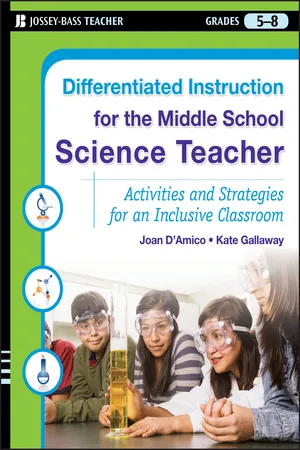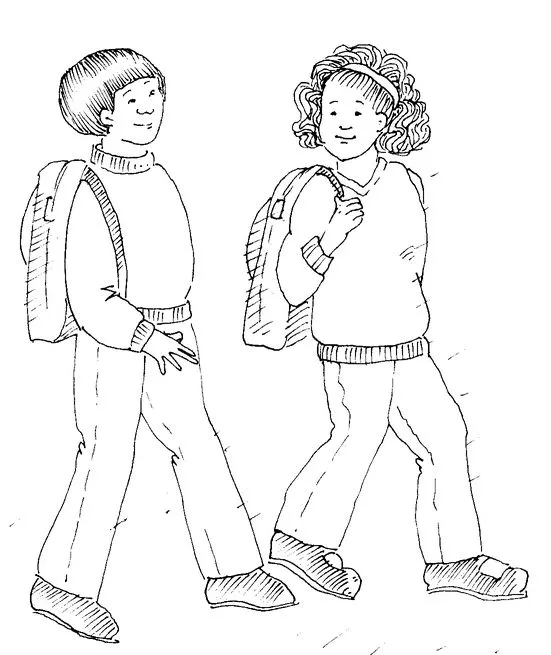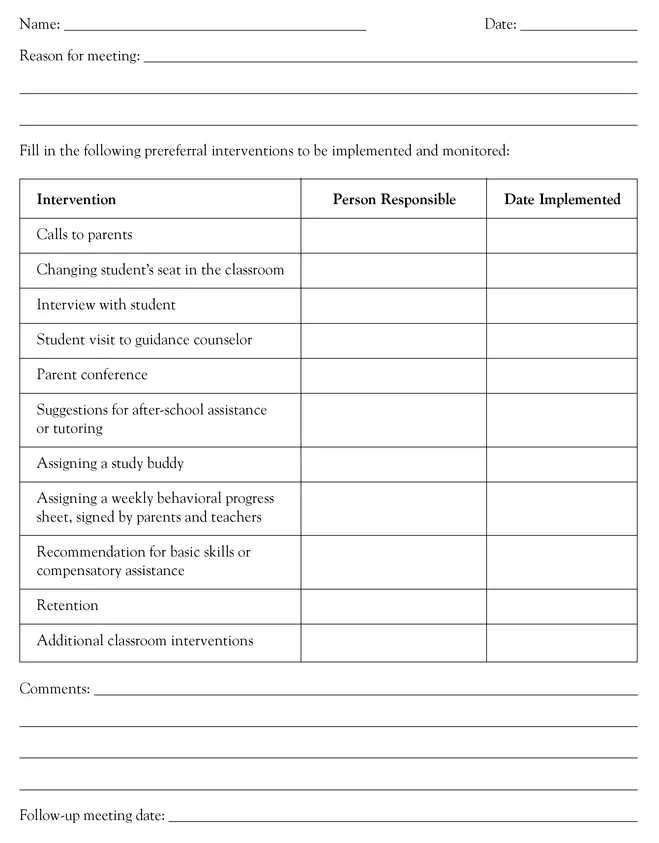![]()
Part One
Being Successful in the Inclusive Classroom
![]()
Chapter 1
Collaborating Effectively
Success in the inclusive classroom is due in large part to collaboration with others in the school. Teaching an inclusive classroom is difficult to do alone, and there are systems in place so that you don’t have to. In this chapter, we look at some general ways of making collaboration work for you.
Collaborating for Intervention
All teachers are eager to communicate information to all of their students. If a student is struggling with classroom performance or cannot understand the material presented in class, then you need to assist and monitor this student to try to help him or her. This chapter focuses on what to do when this approach fails: how to help students when the work continues to be difficult, even after extra assistance has taken place, and there has to be an intervention.
Often a teacher will ask, “What do I do with a student who is having difficulties learning in my class? How can I get him or her help? Do I need to request an evaluation to see if special education is necessary?”
Teachers often bring this topic of discussion to a member of the Child Study Team for advice. A Child Study Team is a group of specialists who are trained to determine if a child has a learning disability. The team is primarily made up of a psychologist, a learning specialist, and a social worker. The first question that the Child Study Team should pose is, “What prereferral intervention strategies have been implemented, and what was the student outcome?”
Prereferral intervention strategies are generally determined by a committee of general education teachers before any specialists are included in the plan. The committee’s job is to try to assist students who are failing subjects within the confines of the general education setting. The student’s main subject teachers, along with the guidance counselor, meet to discuss what can be changed in the classroom setting to enhance student progress. Typical prereferral intervention strategies at the middle school level can include these:
• Changing the student’s seat
• Calling parents for a conference
• Talking with the student
• Assigning the student to a “study buddy”
• Changing the student’s teacher
• Placing the student on a weekly behavioral progress sheet, signed by parents and teachers
• Placing the student on a weekly homework modification sheet, signed by parents and teachers
• Suggesting after-school assistance or tutoring
• Deciding if the student should attend basic skills classes
• Retention
The teachers then agree to implement specific modifications, deciding on a meeting date to monitor the child’s progress and determine if the outcome was positive. If progress is not being made, a referral to the Child Study Team may be warranted.
A checklist can be a helpful aid in determining a clear plan of action. This information can be stored in the student’s permanent record folder (see next page).
Collaborating with the Child Study Team
Establishing positive relationships with all members of the school is important. In an inclusive classroom, open lines of communication between the general and special education teachers, as well as with support personnel, are essential for a thorough understanding of all students’ learning needs. Discussions with past and present teachers, as well as a complete record review, can give the middle school teacher insight into planning for students in the inclusive classroom. The Child Study Team can be an excellent resource for further information on a particular student’s special needs. The members of the team can also offer assistance in implementing modifications and learning strategies set forth by an Individual Education Program (IEP). An IEP is a document that explains a plan of action and program tailored to a student’s specific learning and behavioral needs. This is a legal document. It’s contents must be agreed on by the child’s parents or guardians and implemented in school by the teachers.
Checklist for Prereferral Interventions
Members of the Child Study Team
The core specialists on the Child Study Team are a psychologist, an education therapist, and a social worker. (A speech and language specialist is also part of the core team, but only for preschool students.) These individuals are trained in the diagnosis and remediation of learning disabilities. The team may also include additional professionals who can offer classroom strategies and home suggestions, such as special and general education teachers, school nurses and other staff, speech and motor therapists, paraprofessionals, and the child’s parents.
School Psychologist
In many states, the school psychologist is the main support person responsible for assessing the learning levels of students who are referred to the Child Study Team. He or she can do this through standardized and nonstandardized assessments that measure learning strengths and weaknesses. The most popular tool used by the school psychologist is an individual Intelligence Quotient (IQ) test. The IQ test, an accepted measure of intellectual functioning nationwide, offers one way to assess students’ verbal and nonverbal abilities. The assessment is administered individually and is completed in approximately one two-hour session.
The school psychologist may also assess the student’s academic levels in mathematics, reading, written language, and oral language, as well as learning styles and strengths and weaknesses, through specific diagnostic standardized testing instruments, functional assessments, report card grades, teacher interviews, classroom observations, and past standardized test performance.
Finally, the school psychologist assesses any emotional and behavioral concerns that may impede the learning process. This evaluation can be accomplished through interviews with the student, teachers, and parents, as well as using scales and instruments designed to measure these adaptive functions.
The Learning Disabilities Teacher/Consultant or Educational Therapist (LDT/C or Educational Diagnostician)
Not all states have an LDT/C or educational therapist as part of their school teams. The main roles of this person as a team member are to complete psychoeducational testing to determine the student’s academic strengths and weaknesses and develop remedial modifications to aid in therapeutically teaching the student with disabilities. The LDT/C can also do what a psychologist does as part of the Child Study Team. He or she measures specific levels in mathematics, reading, and written and oral language, and then develops skills and strategies to be used in the classroom for remediation.
School Social Worker
The school social worker is responsible for obtaining student and family background information and determining if the child’s home life now or in the past is having an impact on his or her educational performance. Family, birth, and developmental history are obtained through an interview with the parents. School social workers also can help students during times of impending or actual individual or school crisis.
Speech and Language Therapists
The job of the speech and language therapist on the Child Study Team is to determine if a student’s articulation and language abilities are standing in the way of the child’s learning success in school. Through standardized and functional assessment tools, these therapists can determine if the child has weaknesses in phonology, syntax, articulation, or written language. If they diagnose a communication disorder, the Child Study Team can prescribe individual, group, or collaborative therapy.
Special Education Teachers
Special education teachers are trained to teach skills and strategies for remediation purposes and are in part responsible for implementing the educational modifications designated in IEPs. They are knowledgeable in working with students with learning disabilities and can be essential as support teachers, along with paraprofessionals, in the inclusive classroom.
General Education Teachers
General education teachers in the middle school environment are teachers who specialize in one area of the curriculum, such as English, history, math, reading, or science. They collaborate with special education teachers and paraprofessionals to communicate their subject matter effectively to all students in an inclusive classroom. This is accomplished by cooperative planning and development of pretests, worksheets, learning strategies, study guides, modifications, and reviews.
School Nurse
The school nurse is required to complete vision and hearing screenings and check attendance, as well as offer specific nursing services to special and general education students. These services can include administering medications, changing catheters, checking hearing devices, storing wheelchairs, and monitoring blood pressure and sugar levels.
Guidance Counselors
Guidance counselors work as liaisons with the teachers, students, parents, administration, and school team. They arrange prereferral meetings with the teachers to identify and determine intervention strategies for students who are struggling in the general education environment. They also make sure that prereferral interventions are executed and outcomes are monitored. Guidance counselors are responsible for administering standardized tests, recording grades, and monitoring all students. In a middle school environment, it is not unusual to have a guidance counselor assigned to each grade level.
School Administration
Principals, vice principals, and deans of students are part of the school administration. An ongoing relationship between classroom teachers and the school administration is essential when identifying students with learning disabilities or emotional and behavioral difficulties, because these professionals are often the first people to address consequences stemming from the manifestations of student problems in the classroom. The principals and student deans are usually responsible for assigning detentions, suspensions, and expulsions from school.
Physical Therapists
Physical therapists evaluate and provide therapies to strengthen gross motor skills. They provide these services in an individual, small-group, or natural setting according to their own and the Child Study Team’s recommendations. Recently there has been an increase in administering therapies in a natural setting, such as the school hallway. For a student who needs strength walking in a natural setting, the therapist walks with the student during passing time. A natural setting does not change or contrive the environment for therapy.
Occupational Therapists
Occupational therapists evaluate and provide therapies to strengthen fine motor and organizational skills. In a younger child, individual therapy often seeks to strengthen hand and finger muscles, correct pencil grip, and help the child gain motor control while writing. For older students, occupational therapists are brought in to help enhance students’ written expression and organizational skills. These services are provided in an individual, small-group, or natural setting.
Paraprofessionals
Paraprofessionals, part of the school team in an inclusive classroom, assist the teacher in implementing both group and individual lesson plans. They collaborate with the teacher on strategies and ideas, mark papers, teach small-group lessons, rei...


